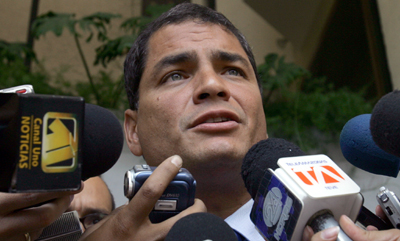New York, July 21, 2011–An editor and three executives from the Ecuadoran news daily El Universo were sentenced to three years in prison and $40 million in fines on Wednesday for defaming President Rafael Correa, according to local news reports. The Committee to Protect Journalists condemned the sentence today and called on Ecuadoran authorities to bring the country’s press law into compliance with international standards on freedom of expression.
In March, Correa brought libel charges against the Guayaquil-based paper’s executives, Carlos Pérez Barriga, César Pérez Barriga, and Nicolás Pérez Barriga (who are brothers), along with opinion editor Emilio Palacio, seeking a three-year prison term for each defendant and $80 million in damages from the paper and its staff. The complaint stemmed from Palacio’s February 6 column titled “NO to lies,” in which he repeatedly refers to Correa as “the dictator.” In reference to a police uprising last September during which three people were killed, Palacios alleged that Correa had ordered troops to fire at will “without warning on a hospital full of civilians and innocent people,” and insinuated that these actions may have constituted crimes against humanity. Correa sought refuge inside the hospital after being physically accosted by protesters and had to be rescued by Ecuadoran soldiers.
Shortly before the trial began, Palacio resigned from the newspaper and wrote that he hoped his resignation would lead Correa to withdraw his suit, the local press reported. On Tuesday, when the trial commenced, the daily’s directors presented a letter that said that El Universo would print a correction, providing the president drafted it himself. Correa rejected the idea, the press said.
Less than 24 hours after the trial started, the judge issued a decision that sent the four to jail for three years each and fined them a total of $30 million, while fining El Universo an additional $10 million in damages. The newspaper said all four would appeal and ask that the sentence be annulled. Correa will also appeal the decision, the press reported, seeking the full $80 million in damages, though he claimed he will not collect any of the money personally.
“We are alarmed that a democratically elected president should resort to such outdated laws to silence critical reporting,” said Americas Senior Program Coordinator Carlos Lauría. “Instead of using these laws, Ecuador should repeal them. We call on the appeals court to overturn this verdict.”
CPJ research shows that Ecuador’s outdated criminal defamation provisions have been systematically used to punish critical journalists. Correa also filed a $10 million civil defamation lawsuit against investigative journalists Juan Carlos Calderón and Christian Zurita, authors of a book called Gran Hermano (Big Brother) on official corruption. In May, provincial radio journalist Walter Vite Benítez was sentenced to one year imprisonment on criminal defamation charges stemming from a critical comment about the local mayor made three years ago.
Ecuadoran law runs counter to the emerging consensus in Latin America that civil remedies provide adequate redress in cases of alleged defamation. December 2009, the Costa Rican Supreme Court eliminated prison terms for criminal defamation. One month earlier, in November 2009, the Argentine Congress repealed criminal defamation provisions in the penal code. And in April 2009, Brazil’s Supreme Federal Tribunal annulled the 1967 Press Law, a measure that had imposed harsh penalties for libel and slander.
There is a growing body of international legal opinion that public officials should not enjoy protection from scrutiny. The Inter-American Commission on Human Rights stated in 1994: “Considering the consequences of criminal sanctions and the inevitable chilling effect they have on freedom of expression, criminalization of speech can only apply in those exceptional circumstances when there is an obvious and direct threat of lawless violence.”
